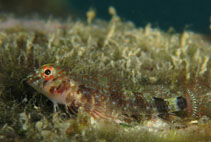| Family: |
Tripterygiidae (Triplefin blennies), subfamily: Tripterygiinae |
| Max. size: |
2.16 cm SL (male/unsexed) |
| Environment: |
reef-associated; marine |
| Distribution: |
Western Central Atlantic: Dominica and Barbados. |
| Diagnosis: |
Dorsal spines (total): 15-16; Dorsal soft rays (total): 8-9; Anal spines: 2-2; Anal soft rays: 16-17. This species is distinguished by the following characters: belly, pectoral-fin base, and cheek naked, spiny preorbital bone in adults, snout blunt, 3 rows of scales above rear pored scales, first two rows about equal-sized, relatively short first dorsal fin (all characters of E. boehlkei complex); fourth and fifth body bars similarly dark and often much darker than preceding bars (which are about equal in intensity); accessory interspace bar or darkened patch between the fourth and fifth body bars; fifth bar sometimes narrower than the 4-5 interspace; 2 broad solid dark bands on the caudal fin; second dorsal fin with three rounded dark spots on the membranes near the spine bases and thin band of fine speckling on the outer rim of fin; anal fin with 3 or 4 dark patches; usually D III+XII-XIII+9 and A II,16-17; mode of 15 pored lateral-line scales and 22 scales in notched midline row (Ref. 93957). |
| Biology: |
|
| IUCN Red List Status: |
Least Concern (LC); Date assessed: 07 August 2015 Ref. (130435)
|
| Threat to humans: |
harmless |
Source and more info: www.fishbase.org. For personal, classroom, and other internal use only. Not for publication.
